Enhancing the Digital and Social Well-being in Schools
The main aim of the project is to develop alternative innovative training material to empower primary school students, aged 6 – 12, to enhance their social well-being and create healthy and active citizens of the future.
Funded by: Erasmus+ Duration: 01/09/2020-31/08/2022

Challenge
Nowadays, students’ well-being in European schools has become a challenge for numerous teachers to confront, partly due to the needs of the new digital world. This has intensified the need to develop effective tools for primary school students to have a healthy online life (JRC) and to reap the benefits from the digital era.
Within this context, all educators and school leaders should acquire the necessary skills to teach their students how to benefit the most of this great potential that is provided to them. What makes this critical is research evidence, which shows that young people do not have the appropriate skills that a person needs in the new digital world (European Commission, 2015).
Apart from this, the inappropriate use of internet can lead to behavioural changes of young people, such as the increase of solitude and the need of avoiding other people’s company to stay alone in order to surf the Internet (Eurostat,2015). Moreover young people can be exposed to inappropriate online content that results in stress or aggression.
Innovation
By providing primary teachers with the necessary skills –based on a comic strip approach- to undertake the role of “active health agents”, iWell aims empowering primary school students, aged 9 – 12, to lead a healthy online life and boost their social well-being.
Action

The European Commission support for the production of this leaflet does not constitute an endorsement of the contents which reflects the views only of the authors, and the Commission cannot be held responsible for any use which may be made of the information contained therein.
Project Partners





Institute of Technology and Development – Project Coordinator (Bulgaria)
